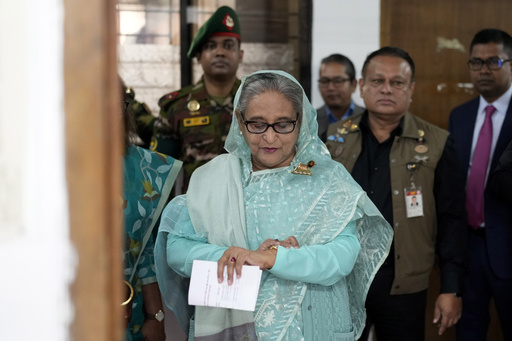
DHAKA, Bangladesh — The Bangladeshi government has officially requested the extradition of former Prime Minister Sheikh Hasina from India, following her escape to New Delhi in August amidst extensive student demonstrations that culminated in her departure after 15 years in power. This announcement was made on Monday by the nation’s foreign affairs advisor.
Md Touhid Hossain addressed reporters, stating that a diplomatic note has been submitted to India’s Foreign Ministry, seeking Hasina’s return to face legal proceedings. However, he refrained from disclosing specific details regarding the request.
In response, India’s Foreign Ministry acknowledged receipt of the extradition request but did not offer any further comments at that time.
Reacting to the government’s appeal, Hasina’s son, Sajeeb Wazed, took to Facebook to express his criticism. He questioned both the legitimacy of the ongoing judicial processes and the impartiality of the tribunal tasked with addressing the allegations against his mother. Wazed characterized the tribunal as a political tool wielded by the current unelected government, labeling the judicial process as a “farcical trial” and suggesting that it represents a coordinated effort to undermine the leadership of the Awami League, the party led by Hasina.
He highlighted the wider context of ongoing violence and repression, noting that numerous opposition leaders and activists face extrajudicial killings and unlawful charges under the current regime, leading to a climate of fear that allows for law enforcement’s unchecked brutality.
Sheikh Hasina, who fled to India post-uprising, is under scrutiny for various court cases, particularly those related to allegations of crimes against humanity in connection to the civil unrest that reportedly resulted in significant casualties earlier this year.
The International Crimes Tribunal located in Dhaka has issued arrest warrants for Hasina and several of her associates, and the interim government has engaged the assistance of Interpol for her apprehension.
In a previous statement, Muhammad Yunus, the interim leader and Nobel laureate, indicated that his administration would take steps to secure Hasina’s extradition and reiterated the government’s commitment to prosecuting her and former officials for alleged offenses linked to the uprising. Additionally, he invited the United Nations to assist in investigating the events surrounding the incidents that led to fatalities during the protests.
Amid this turmoil, Hasina has also requested an investigation, implying that the circumstances surrounding the deaths may extend beyond those involving security personnel.
Human Rights Watch, based in New York, commented that with an arrest warrant already issued for Hasina, the government led by Yunus should consider reforms to abolish death sentences linked to the tribunal in order to facilitate a just and impartial legal process.
The organization further asserted that unless the government places a moratorium on capital punishment and revises laws to guarantee fair trials, countries currently harboring Hasina and her former officials should refrain from extraditing them to Bangladesh.

